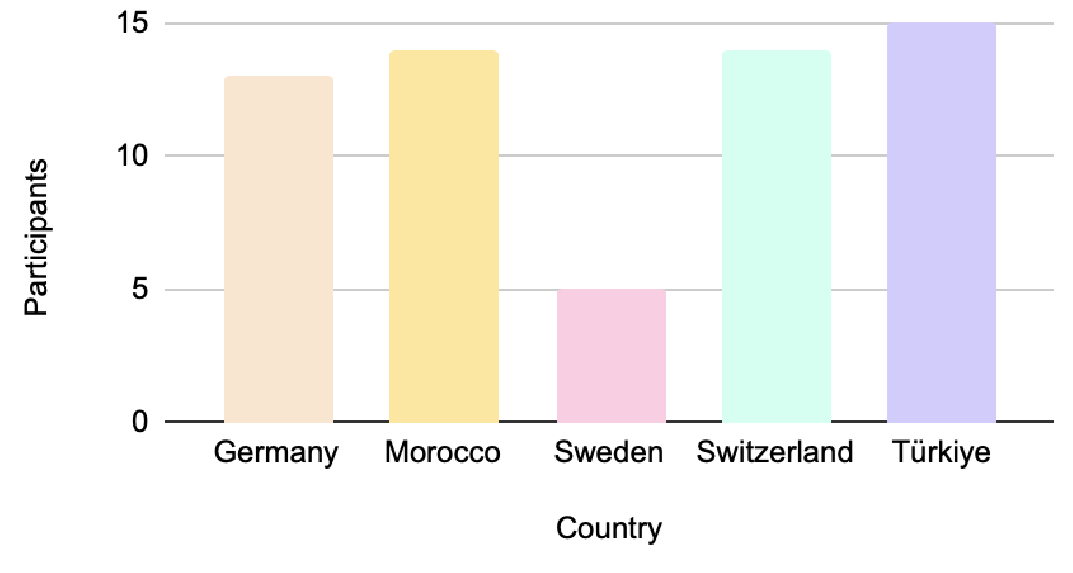by Rukiye Altın (Kiel University), Monica Landoni (Università della Svizzera italiana) and Vivian Vimarlund (Linköping University),
Digital technologies are transforming society, yet gender inequalities in science, technology, engineering, and mathematics (STEM) remain a persistent challenge [L1] in all levels of education. Gender stereotypes in STEM function in two ways: on the one hand, they undermine girls’ interest and performance; on the other hand, they boost boys’ attraction to and confidence in the field [L2].
The Erasmus+ project Breaking Boundaries in K-12 Classrooms (BBC) is addressing this imbalance by equipping teachers, school managers, and pre-service educators with practical strategies for teacher training and the creation of inclusive learning environments. The project involves teachers and school managers at the K-12 level. The outputs of the project will help evaluate progress and assess the maturity of efforts to embed gender, equality, and intersectionality in daily teaching as well as support the development of a network for sharing expertise and experiences.
The project entitled BBC (2024-1-SE01-KA220-SCH-000251633) brings together universities and schools from Sweden, Germany, Switzerland, Türkiye, and Morocco. The project builds on previous knowledge drawn from a previous Erasmus project entitled Women STEM-UP, as well as from experience in Linköping regarding the implementation of gender and the development of strategies to promote interest and raise awareness of the need of gender diversity in K12 educational fields.
At the start of the project, a maturity scale entitled “Awareness of Gender Equality at the K-12 Level” provided a way to assess schools’ starting points and track progress based on previous experiences mentioned above. Early results revealed varying levels of awareness but a shared need for practical guidance. Making this tool and its findings publicly available ensures the project’s influence will extend beyond its 15-month lifespan.
The project is coordinated by Linköping University (Sweden), and unites partners from Christian-Albrechts-Universität zu Kiel (Germany), Università della Svizzera italiana and SUPSI (Switzerland), Yeditepe University and İSTEK Acıbadem Schools (Türkiye), and Université Abdelmalek Essaâdi (Morocco).
One of the main steps in this project is the use of context-based empirical examples to discuss how teachers can recognise the presence of stereotypes and challenge them, reflect on unconscious biases, and adopt inclusive pedagogical models. The discussion took place in two workshops involving teachers and manager /leaders. The workshops employed participatory design methodology to stimulate active discussion about how educators integrate gender awareness into everyday classroom practices. Activities included in the workshops:
- An interactive “Memory Association Test” game to uncover unconscious bias;
- Analysis of national data to contextualize discussions;
- Exploration of real classroom scenarios for inclusive strategies;
- Tools and techniques to address “master suppression techniques” such as ridicule or invisibility;
- Discussions on inclusive pedagogy, language, and representation.

Figure 1: Workshop attendees per country.
By the end of the workshops, participants reflected on their own biases, shared strategies, and identified practical tools for action (i.e. contextualized examples, choices of gender neutral literature, alternative examination methods etc). One of the most important outcomes of the workshops was teachers’ recognition of the need to move from awareness to tangible change in their classrooms.
In parallel, managers have the opportunity to explore systemic approaches to integrating gender inclusion into K–12 education. They examined the persistent “leaky pipeline” problem, in which women leave STEM fields despite early interest and academic success and discuss the need for policies and work plans. Further, managers have the possibility to discuss with peers issues such as:
- Gaps in institutional policies and the lack of follow-up mechanisms;
- Limited access to resources for inclusive practices;
- The role of leadership in fostering inclusive organizational culture;
- Managers as agents of change and drivers of innovation and renewal.
The partners participated in a two-day workshop in Kiel, Germany, attended by 38 participants from all partner countries. This event brought together teachers, pre-service educators, and managers to share the outcomes of the two workshops and to identify and present contextualised, evidence-based examples on how to stimulate and embed inclusiveness, gender and equality issues in daily teaching. Participants exchanged national perspectives, discussed challenges, and strengthened the established international peer network that will continue to contribute to achieving sustainability of the outcomes and shared experiences.
The workshop also provided a platform for school leaders and policymakers to connect with classroom practitioners. By closing the project with a collaborative forum, the consortium ensured that its results were not only disseminated but also anchored in the professional communities that will carry them forward.
The robust network of teachers and school leaders established during the project, together with the knowledge and empirical examples shared during the workshop in Germany, provides a sustainable foundation for collaboration across Europe and beyond. By empowering educators and decision-makers alike, BBC has shown how inclusive teaching strategies can reduce gender disparities in STEM and foster innovation for a more equitable digital future. The project concluded with a final workshop at womENcourage 2025 in Brașov, Romania, in September to disseminate the project and reach out educators from different countries with interest in the STEM areas and in how to innovate and renew gender neutral teaching approaches.
Link:
[L1] https://www.breakingboundariesstem.eu
References:
[1] J. C. Blickenstaff, “Women and science careers: leaky pipeline or gender filter?,” Gender Educ., vol. 17, no. 4, pp. 369–386, 2005.
[2] S. L. Kuchynka, A. Eaton, and L. M. Rivera, “Understanding and addressing gender-based inequities in STEM: Research synthesis and recommendations for US K-12 education,” Soc. Issues Policy Rev., vol. 16, no. 1, pp. 252–288, 2022.
[3] C. C. Klimaitis and C. A. Mullen, “Access and barriers to science, technology, engineering, and mathematics (STEM) education for K–12 students with disabilities and females,” in Handbook of Social Justice Interventions in Education, Cham: Springer, 2021, pp. 813–836.
Please contact:
Rukiye Altın, Kiel University, Germany
Monica Landoni, Università della Svizzera Italiana, Switzerland
Vivian Vimarlund, Linköping University, Sweden










